Don't wanna be here? Send us removal request.
Text
Advertising in Different Decades
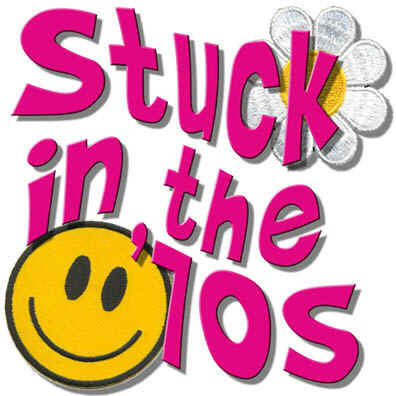
I watched three different commercials from the 1970s: Dr. Pepper, Parkay, and Kool-Aid. All of the commercials were highly exaggerated and two of them featured short musical jingles. In the case of the Dr. Pepper commercial, it was an entire dance sequence that included a cameo from Popeye. These commercials address the audience through music and little quirky sayings that could catch on and get people to say them. The talking butter in the Parkay commercial is quirky and helps make the commercial memorable while also having an audience that would probably comprise of an older generation, due to the older actor and the interest in butter, a commodity bought mainly by parents/older individuals. The audiences for these commercials could easily be for both parents and children. Though the Kool-aid was definitely geared towards younger children, with the child actors and memorable jingle. The Dr. Pepper commercial was geared more towards teenagers, with the attractive young man promoting the product while engaging a number of other young people to sing and dance with him.

I watched two commercials from the 1980s: the Pepsi commercial and the jello pudding commercial. The drive behind both of these commercials is celebrity endorsement. Pepsi managed to get Michael Jackson to promote their product, while Jello Pudding is being pushed by Bill Cosby. Including Michael Jackson in the commercial is a tactic to try and appeal to the youth of this generation; the teenagers and young adults who are familiar with his music and most likely idolize him. Bill Cosby is a goofy father figure and someone that kids have grown to trust, having watched the Cosby Show. He also sends a message to the parents to buy this pudding "because it's wholesome." Bill Cosby is respected by people of all ages and is therefore someone people would follow and listen to.

I viewed two commercials taken from the 1990s: one for Gap and the other for Volkswagen. What these two commercials had in common was how they utilized rhythm, choreography, and music to entice the audience to buy their products. The Volkswagen featured a dreary setting, but had random, everyday things (starting with the windshield wipers) setting into a rhythm and the ad was edited in a way that had all of the movement and beats transition seamlessly to create one, continuous rhythm. The Gap commercial was much more lively, featuring people wearing khakis dancing with each other to upbeat swing music. The choreography in this ad was amazing, featuring people lifting each other up, moving in time to the fast pace of the music, and dancing around each other in time. It makes both products more interesting and memorable if the audience (which in both cases, is a younger audience, who get caught up in music and rhythm) can think of the music or rhythm in association with the commercial.
0 notes
Text
Selling Yourself for Free
Advertising will never die.
According to Lanier, anyway. He conveys the idea in "You are not a Gadget" that advertising will only shift forms and adapt to the current culture. It will never become obsolete.
The entire concept of advertising in the digital age is an interesting one. In Sacks article "The Future of Advertising," she outlines how the large advertising agencies are failing to adapt to the technology available today. However, the younger people in the business or "digital natives," as she terms them, are quite competent with it. They are using advertising in a new and almost insidious way, in Lanier's mind at least.
Anytime you "like" something on Facebook or "pin" something on pinterest or buy something off of Amazon, data is being transferred. Data about you. All your likes, dislikes, habits, preferences, etc. They then use this to shape the ads you would be interested in. Or they recommend products you would be most likely to buy.
Lanier is virtually outraged that we are giving away this precious information for free. It is his firm belief that we charge people for these "bytes," these little pieces of ourselves that people are using to make money. He believes it would be a more fair transaction: we get paid to give our information so that ads can sell things to us.
However, we are already benefiting from this. The things we "like" or "pin" or whatever help craft products and things we would buy. This is highly prevalent with film, where the box office can determine what types of movies are made. Whatever more people go to see, is what ends up being manufactured. There's a reason why we have so many superhero movies. So in exchange for information about ourselves, we are receiving entertainment we want and products that we can/will use. In my mind, that's a pretty fair trade.
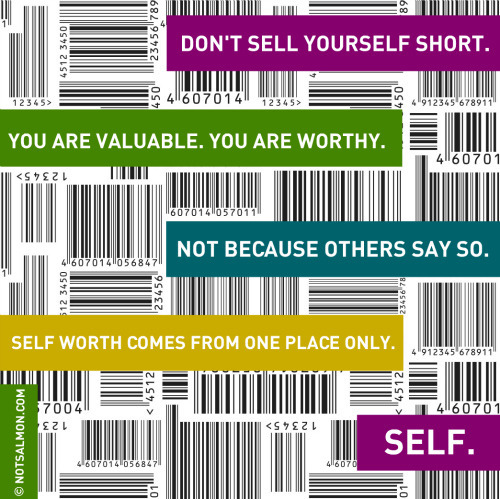
0 notes
Link
Justin Timberlake is a celebrity who was made famous well before American Idol and is interesting to compare to Stahl's argument. Although he was not a contestant on any talent show, I think his rise to fame correlates with the points Stahl makes in his criticism of American Idol. Timberlake started out as a part of the Mickey Mouse Club and started to really expand his career when he formed N'Sync. What I find interesting is that Timberlake is billed from the start as being above the average person. Wheras contestants on American Idol need to seem relatable to the audience, Timberlake started out on a club that also featured other future popstars such as Britney Spears and Christina Aguilera.
In fact, his biggest jump to fame, N'Sync, was mainly made possible by portraying himself as the "perfect" man. Everything about him, from his appearance to his songs, showcase how he embodies the desirable male. Women want him, men want to be him (sometimes). There is no real relatablilty; he is solely an idol, someone for people to look up to.
Granted, American Idol does this too, makes their contestants seem larger than life. But Timberlake did not need that added layer of closeness that the contestants also rely on. The image he crafted is one of perfection, at least, in his initial rise to fame. Idol performers need to maintain a balancing act, according to Stahl, for audiences to connect with them and find them to be real people.
Celebrities, with the dawn of the internet are facing this divide when it comes to the audience. People used to just worship them, want to be them. Now, audiences are looking for celebrities who arelikethem. For example, Jennifer Lawrence ( a film actress) is championed as a heroine on Tumblr because of how open and relatable she is in her interviews. She does not present a perfect image of female celebrities, but reflects, mostly, the thoughts and feelings of the "average" teenager/young adult.
It's this divide that celebrities are trying to breach now. Timberlake is doing this with his films. He is looking to branch out in dramatic roles (The Social Network) to gain credibility with a new audience, one that he wants to relate to. By acting in these films that have deeper meaning to them, he is trying to find different ways of addressing a new audience so he can maintain relevance.
0 notes
Text
Warrior Princess: My Adventures in Runescape
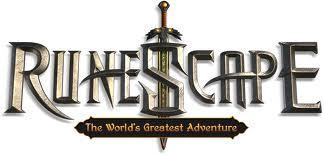
Runescape is the only MMORPG I was ever really involved in, due solely to the fact that is was free. I remember spending many hours playing as my avatar and running around fighting random villains, completing quests, and teaming up with my brothers on occasion.
I decided to create a new account and played for a few days on the updated version of the game.
The layout of the game is fairly similar to when I left it (although there is the option to play through Facebook). The same quests are still available. The world layout, though expanded, has many of the same places that I am familiar with.
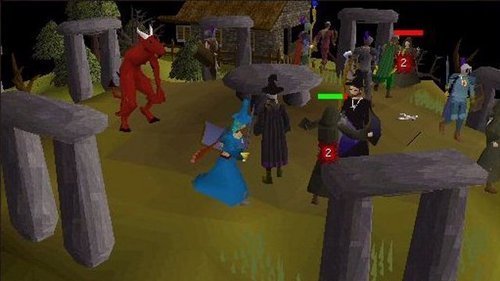
I began my adventure following the tutorial instructions and then working on my own goals for the time being. I started working on the simple quests, which didn't take too long since I had the advantage of having done them before.
By the time I had finished playing for the day, I was at a respectable level 20 and had a better wardrobe, a large sum in the bank and had completed all of the quests I could on my own.
During my time playing, I noticed element of harassment that we discussed in class. For a while, one male character (I assumed he was, since his player was decidedly male) followed me around, constantly asking me if I would be his girlfriend. I had no idea who this character was and I was uncomfortable by his question, especially since he did not leave me alone even after I asked. I ended up running away and into a territory where he could not follow. It was not a dangerous situation, but I was made uncomfortable nonetheless.
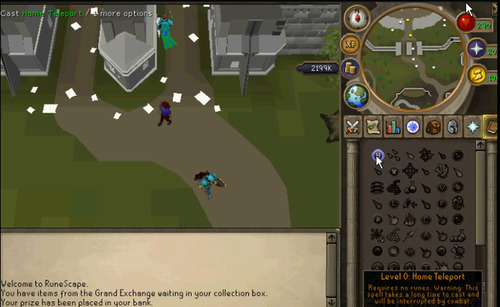
I noticed elements of sexualization of characters throughout the game. Many wore low cut outfits and generally leaned towards being beautiful rather than practical. The men also seemed, as a whole, to favor more attractive physical builds and hairstyles. People, myself included, had the ability to change their appearance and everyone (vast majority) opted to make themselves more attractive. Evidently, to form relationships, although the person who was pursuing me did it all wrong.
I also noticed how long you can be in that online world. I remember just how addicting it really is. In Second Skin, they showed people who devote virtually their real life to a video game one. It sounds asinine and pointless, but when I logged into Runescape, I "wasted" several hours leveling up, exploring the world, and re-acquainting myself with this place I thought I had left a long time ago. It's amazing how sucked in you can get. I was building the life I wanted to have: adventures all the time, controlling my own funds, not having to worry about paying for huge expenses, living a life of chance and danger. It was almost a dream come true.
These three points touch on arguments on gaming that we discussed in class and saw in the film Second Skin. I am acutely aware of how they have affected my gaming experience and how the points raised are true and completely relateable. I understand and have experienced the empowerment of gaming. I have also felt the uncomfortable sensation of harassment. Gaming is an interesting medium that provides power to the powerless but also increases the arrogance of those whose ego far exceeds anything else. I still love the medium though and I will continue to indulge in it to fulfill my own desires. But I will also work to keep it in check and not let it get the best of me.
0 notes
Text
Captain's Log: The Perils of Being Stranded Without Internet

Saturday November 17th, 2012
4:00 pm
I begin my journey into an internet-free existence
My phone is entrusted to my companion Emily
All hope is abandoned
4:40 pm
My comrades and I go to see Wreck-It Ralph (my 4th time).
The movie is still amazing and they enjoy it as well
No desire to text detected
6:30 pm
Get ready for the KMB Indoor Show concert
10:00 pm
Show has finished. I performed admirably. Resisted urge to log onto Facebook and post status about it.
Went out to celebrate with friends. Favored interacting with real people as opposed to chatting online.
12:00 am
Settle in to watch movies on DVD, not Netflix, with roommates.
Laptop was only used to watch movies and not the internet
Felt the urge to check on my dragons on my facebook game, but resisted temptation
Sunday, November 18th 2012
12:00 pm
Woke up and dawdled in bed. Internet not the first thing on my mind.
1:30 pm
Headed to Heritage Center for final KMB Indoor Show performance.
Too busy preparing for performance to care about Facebook or texting.
3:00 pm
Performance has started.
Close to the finish line, but I'm not acutely aware of it.
5:00 pm
Final performance is complete. I have regained usage of technology but I barely notice.
I am with friends and I don't feel the need to text or Facebook anyone
6:00 pm
Went out to eat with Emily. No need for texting as the one person I text most frequently is with me.
I was fortunate in choosing a busy weekend to go without internet. I am certain that I had chosen a time when I had little to do, I would have struggled much more than I did.
That admittance is a testament to how much of my life is now shaped around technology. I know that I have to plan something like this out because I am unable to just quit using the internet any time I want. Essentially, I have become "locked-in" to the net and Facebook and other various sites.
However, I do know that even if I am extremely addicted to these sites, if I have something else to replace it with, I am able to give up the internet.
An example of this is my job as a camp counselor. When I work at summer camp, access to the internet is very limited and not necessary for the job at hand. So I, like my co-workers, learn to live without it and I am able to distance myself from it because I have a task that fills that void.
Which raises an interesting point: Is technology filling a gap in our lives? Or by letting it in, do we create a void that wasn't there in the first place? These are questions I do not know the answers to, but would be keen on discovering how they relate to my own experiences with technology.
0 notes
Text
"I Can't Hear You!"
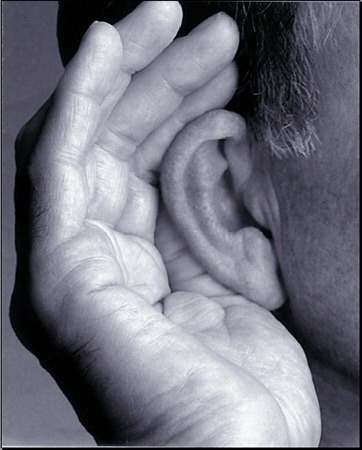
In class, for our last day discussing Lanier's "You are not a Gadget," we composed a number of questions to answer.
I was a part of a group that answered the question: Alternative (reasons) for lack of decade-defining sound?
Lanier is disenchanted with the distinct "lack of sound" in our generations music. There is no core musical motif that defines who we are as a group.
Our group concocted some interesting responses to that.
The major and prevalent answer was that we have access to a wide range of music and musical styles. We don't have to attend live concerts to hear music once, or own bulky record/record player. We have the capability of tuning in to centuries worth of music at the click of a button.
Music libraries are vast and contain more than we could have ever dreamed of. It is possible to never listen to all the music in your library within a lifetime.This is a big part of the reason why we don't have one sound: we have so many.
This astronomical access allows artists to be inspired by music from different time periods and different locations in the world. They can draw lyrics from one source and musical instruments from another. So it is far more likely to hear a diverse range of sounds in the music produced today than just one decade-defining noise.
There is also an increased usage of computers to create music. We talked about how we've become "locked-in" to using MIDI to compose popular music. There are now artists such as DeadMau5 and Skrillex that compose highly complex pieces of music in a digitized format.

Naturally, Lanier has disdain for the way popular ("modern") music is produced and its reliance on archetypes that have been present for several decades. He's looking for our generation to actually CREATE something. So our argument that the "sound" of our generation is a mixture of different sounds, would not appeal to him.
In fact, it would further prove his point. There is nothing "new" about our sound. Arguably, the closest we come is with someone like Skrillex who uses digital media to create music, but works with in it in a way
I honestly don't know what "our sound" would actually sound like. And maybe that's the issue. You are able to categorize decades with different types of music and invented musical styles. However, Lanier feels as if we just perpetuate the styles that have come before us. Or try to reinvent them. I can agree with that, but because I have grown up with this culture, I have no idea how to change or reverse that.
0 notes
Text
Journalism- Negative Triumphs
During my little experiment, I noticed that the negative news was the most prevalent. As the event (homecoming policies) was actually happening, I was aware of all the drama that ensued.
Any news about it that was talked about or released had a negative slant to it. There was no positivity to be found concerning it. There was virtually no one on campus who could say a good thing about it.
In relation to the argument about which type of news is shared more, in this case, it was definitely the negative news. In my opinion, I think negative news is shared more. I think that's mostly because it sticks with people longer.
When they feel emotions like sadness or anger in relation to something, that something becomes stronger and resonates with them. Of course, I think the same can be said of positive news.
In all honesty, I think the media hype is what's to blame. Granted, people nowadays do their own signal boosting and the homecoming story is a great example of how students took something the administration wanted seen as positive and emphasizing the negative aspects of it. People were upset with the decision and decided to spread that among the student body.
This, in my opinion, relates to orality. People took this announcement and talked to others about it in a negative fashion, which, in turn, changed the meaning of the message. There was an audible buzz on campus when this news was released, because people were talking about it so much. And by talking about it in a negative way, the message, was in the moment it was talked about, negative. And this was perpetuated all over campus. Every time the story existed (i.e. when it was talked about) it was in a negative form. People remembered that feeling. And so when the subject was constantly brought up, so was that feeling.
I think this applies to any type of news. Whenever it's talked about in the same context with the same emotions, it forms an emotional response within a person. So when they hear it again, it will trigger that emotion. Such is the power of orality and our connection to the spoken word.
0 notes
Text
Musings of a Mediocre Artist
To fulfill an assignment, I drew three sample pages for "The Medium is the Massage."
It had interesting results, mostly because I am inept in the artistic department, but also because it caused me to reflect upon the teachings of McLuhan.
That is essentially what his book is: a learning tool. Or, at least, that is what he intends for it to be. It's like a gateway drug to his radical theories on media. It's very difficult to not be affected by his thoughts and observations.
The first picture is of an eye, on one side it is open, on the other it is closed. It is captioned with the words Don't Blink and there is a quote underneath about how understanding is related to what the mind can see.
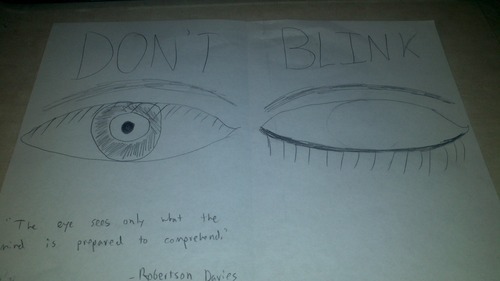
This is related to McLuhan's thoughts on the current structure of society that he talks about in his book. I was also inspired by the terms "amateur" and "environment." In order to break away and create our own environments, we have to look beyond what we can see. We have to envision our own way of doing things and communicating, without being bound by the structures that contain us in society. The term "Don't blink" refers to the concept of hesitation and of letting that moment pass you by. McLuhan wants people to think outside their boxes and not be daunted by the environments that are already in place.

The second layout I constructed was , in my mind, a rather crude depiction of a train entering a tunnel that is actually someone's mind/eye. It is a train of "information" traveling fast and relentlessly. It represents the idea that we are constantly receiving information. Just like how McLuhan uses the nervous system to represent media, so I use the train to depict information in media being delivered. We are bombarded, constantly, by a deluge of information concerning a variety of things. We consume and are affected by it all the time. It is more relevant now, with the advent of social media and the internet. It changes us, alters us. By accepting this information, we are accepting a "ticket to ride" so to speak. Receiving this information changes us and by taking in so much of it, we are constantly being altered; constantly getting on that train. Or being hit by it.
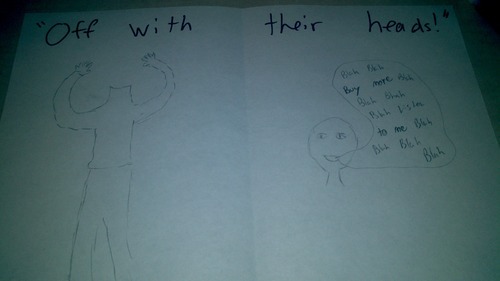
The third image I drew was a picture was a headless person on one page, with its chatting head on the other. The oft-quoted line from Alice in Wonderland, "Off with her head," switched the pronoun to the "their" to slightly alter the audience. The head, despite being detached from the body, still talks, but it's useless chatter. This picture is not as obvious as I could've made it, but my meaning relates partially to consumption in culture and how there is this desire to end ads and involvement in media, but despite being combated, it never seems to stop. In a way, I relate to the idea of new media doing the work of the old. Word of mouth is depicted as a viable tactic, but the head is cut off, which I attempted to symbolize as the resistance to reverting to old ways of doing things. Yet it still persists; we're not able to completely get rid of it. That's the problem we have with old media; it still hounds us and we need to create new environments in order to change that.
These pictures were my attempt to emulate McLuhan and despite my lack of artistic prowess, I believe I was able to craft something that resembled his work, theories, and teachings.
0 notes
Text
Positive News- Homecoming Policies Enacted to Keep Students Safe
A new homecoming policy was enacted in response to the recent fire that endangered the lives of several students.
The administration at Alma College drafted a set of homecoming party policies with the intention of keeping the students safe during the homecoming celebration.
The two tenants of the policy that, according to Facebook comments, caused the most turmoil are 1)the requirement of a third party vendor, and 2) smaller gatherings are limited to no more than 40 guests by invitation.
It was made clear by the panel that a third party vendor needs to be used for major parties. There are no issues if alcohol is not served but if alcohol is present, specifically at the Greek houses, then security will have to be involved.
It was mentioned that President Abernathy would pay for food and transportation would be provided by the college.
This policy provides students with a safe place to go that is free of alcohol and is observed to prevent harmful accidents from occurring.
A large party such as this could increase social interaction between the various fraternities and sororities, fostering bonds of friendship.
0 notes
Link
0 notes
Text
Negative News- New Homecoming Policy Restricts Students
There is a new homecoming policy enacted to keep students from having huge parties in fraternities and sororities.
This has resulted in an uproar among the student body concerning the recent changes in the school’s policy concerning parties, especially those that occur with Greek Life.
The two tenants of the policy that, according to Facebook comments, caused the most turmoil are 1)the requirement of a third party vendor, and 2) smaller gatherings are limited to no more than 40 guests by invitation.
It was made clear that a third party vendor needs to be used for major parties. There are no issues if alcohol is not served but if alcohol is present, specifically at the Greek houses, then security will have to be involved.
The Greek organizations would not have to participate in the third party vendor, but they would not be allowed to hold any large parties.
There were concerns raised about how certain Greek organizations, Sigma Chi and SAE, would find a third party vendor since their policies do not allow for it.
It was stated that the party at the country club would not be restrictive, but would focus on alumni and students.
It is a restrictive policy because it forces alumni to find other places to gather and socialize instead of going to their respective fraternity/sorority houses to celebrate.
Also, if all students have to attend one big party, it puts fraternities/sororities together that don't get along and could result in altercations.
It is an issue that not only has angered the student body, but has caused them ton confront the administration and find ways to subvert the policies.
A majority of the comments on the homecoming Facebook page also state how they did not feel involved in the decision-making process. Other comments also stated the need for a public forum to discuss the policies.
“When will there be a forum (an efficient and informative one since I know the college will claim they've done this but we all know they haven't) with all of campus to discuss this?”
The policies have not helped any of the students or kept them safe but stirred up animosity and made it more difficult for alumni to come and interact with their fraternity/sorority.
0 notes
Audio
This is my audio recording of my response to the conversation about McLuhan's "The Medium is the Massage." I pretended to be a guest panelist from the future and spoke my responses to the points raised in the discussion.
1 note
·
View note
Photo
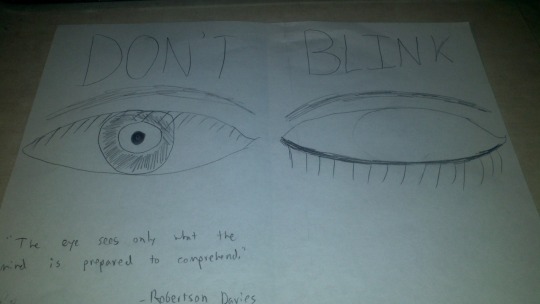

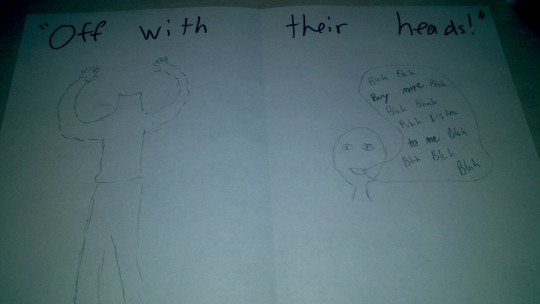
These are the pictures I drew as additions to McLuhan's "The Medium is the Massage."
0 notes
Link
0 notes
Link
0 notes
Video
youtube
This is my video reaction concerning my 24 hour period spent without access to the internet or text messaging.
0 notes
Text
"Nostalgic Malaise"- How we Idolize the Past
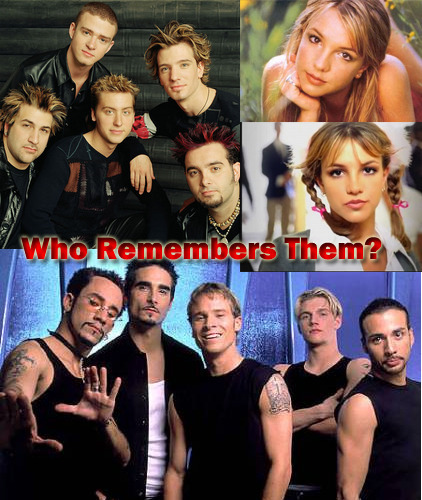
During our first reading of "You are Not a Gadget" one of his arguments that caught my attention was how online culture is obsessed with mash-ups and focusing on the cultures that existed previous to ours.
I found this particular argument to be compelling because it's something that I notice and in some cases, participate in. The question to ask is why is there so much obsession with the past?
I've seen it prevalently on Tumblr and Facebook: there are entire groups dedicated to discussion and promotion of cultures that existed in the 90s or 80s.
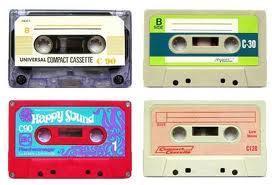
I think the argument of nostalgic malaise stems from two things: 1. We have become indoctrinated into a certain type of culture because everything that is created falls into archetypes and molds that were created previously. 2. There seems to be people who are discontented with the current cultural trends and feel the need to complain about it by referencing how "it was better back then."
From his readings, Lanier finds it counterproductive of online culture to idolize the past because it's a waste of the extensive opportunities of the internet. To him, it just continues to show how "locked-in" we are to one type of culture and that we are too comfortable to try and alter it.
I do agree with him, but at the same time, I am subject to this myself. I fondly recall the culture I grew up in and I still reference and reflect on it. It is difficult for anyone to completely abandon the culture they were raised in and so when their main method of interaction moved to the internet, so did their culture.
The difficulty is moving away from that obsession with the past and towards creating something enlightened through the usage of the internet. Lanier is worried that the digitizing of the world will cause it to lose its humanity. He fears that there will be no human ingenuity because people will be too comfortable with the way the world currently is.
I believe he is right in that sense. We are fairly complacent when it comes to our technological usage. We are deeply ingrained into sites like Facebook or Twitter, not comprehending or caring that they have the potentiality to limit us. There is evidence of this in the repeated ways Facebook gets used.
However, I do believe that there is the potentiality for change. But the first step towards it is discourse. In order to shake off the shackles of the past, we must first talk about moving forward and how to do so. The internet has gifted us with the ability to increase collaboration tenfold, yet we seem content in just creating mash-ups of previously expressed cultural ideas or staying in the same network of friends. New ways of thinking are brought to forefront when they are discussed more openly.
Tumblr is a place where I have seen people both reminisce over the past as well as confront and challenge new ideas. Granted, the discourse is not done gracefully or evenly, but there are pockets and spurts of interesting ideas talked about.
Of course, the discourse I am talking about relates to cultural change, whereas a good portion of Lanier's manifesto talks about the technological changes. However, I believe that as the culture begins to move away from obsession with the past, we can build a stronger future- which could definitely involve technological advancements that could work against the lock-in we are trapped in.
0 notes